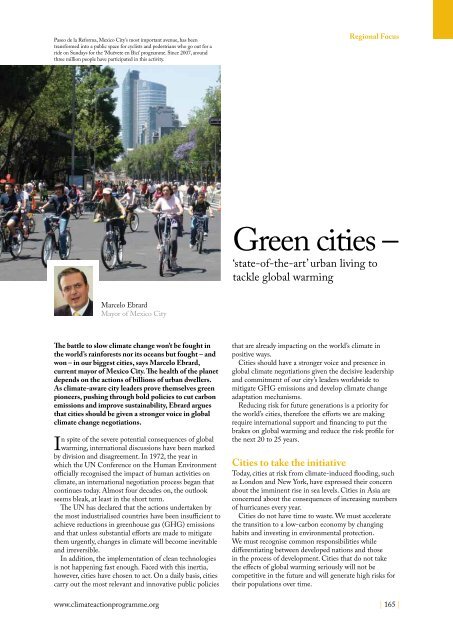Climate Action 2010-2011
Create successful ePaper yourself
Turn your PDF publications into a flip-book with our unique Google optimized e-Paper software.
Paseo de la Reforma, Mexico City’s most important avenue, has been<br />
transformed into a public space for cyclists and pedestrians who go out for a<br />
ride on Sundays for the ‘Muévete en Bici’ programme. Since 2007, around<br />
three million people have participated in this activity.<br />
Regional Focus<br />
Green cities –<br />
‘state-of-the-art’ urban living to<br />
tackle global warming<br />
Marcelo Ebrard<br />
Mayor of Mexico City<br />
The battle to slow climate change won’t be fought in<br />
the world’s rainforests nor its oceans but fought – and<br />
won – in our biggest cities, says Marcelo Ebrard,<br />
current mayor of Mexico City. The health of the planet<br />
depends on the actions of billions of urban dwellers.<br />
As climate-aware city leaders prove themselves green<br />
pioneers, pushing through bold policies to cut carbon<br />
emissions and improve sustainability, Ebrard argues<br />
that cities should be given a stronger voice in global<br />
climate change negotiations.<br />
In spite of the severe potential consequences of global<br />
warming, international discussions have been marked<br />
by division and disagreement. In 1972, the year in<br />
which the UN Conference on the Human Environment<br />
officially recognised the impact of human activities on<br />
climate, an international negotiation process began that<br />
continues today. Almost four decades on, the outlook<br />
seems bleak, at least in the short term.<br />
The UN has declared that the actions undertaken by<br />
the most industrialised countries have been insufficient to<br />
achieve reductions in greenhouse gas (GHG) emissions<br />
and that unless substantial efforts are made to mitigate<br />
them urgently, changes in climate will become inevitable<br />
and irreversible.<br />
In addition, the implementation of clean technologies<br />
is not happening fast enough. Faced with this inertia,<br />
however, cities have chosen to act. On a daily basis, cities<br />
carry out the most relevant and innovative public policies<br />
that are already impacting on the world’s climate in<br />
positive ways.<br />
Cities should have a stronger voice and presence in<br />
global climate negotiations given the decisive leadership<br />
and commitment of our city’s leaders worldwide to<br />
mitigate GHG emissions and develop climate change<br />
adaptation mechanisms.<br />
Reducing risk for future generations is a priority for<br />
the world’s cities, therefore the efforts we are making<br />
require international support and financing to put the<br />
brakes on global warming and reduce the risk profile for<br />
the next 20 to 25 years.<br />
Cities to take the initiative<br />
Today, cities at risk from climate-induced flooding, such<br />
as London and New York, have expressed their concern<br />
about the imminent rise in sea levels. Cities in Asia are<br />
concerned about the consequences of increasing numbers<br />
of hurricanes every year.<br />
Cities do not have time to waste. We must accelerate<br />
the transition to a low-carbon economy by changing<br />
habits and investing in environmental protection.<br />
We must recognise common responsibilities while<br />
differentiating between developed nations and those<br />
in the process of development. Cities that do not take<br />
the effects of global warming seriously will not be<br />
competitive in the future and will generate high risks for<br />
their populations over time.<br />
www.climateactionprogramme.org | 165 |












